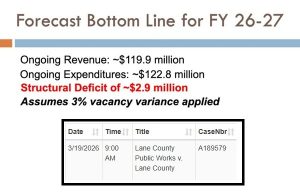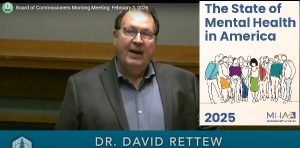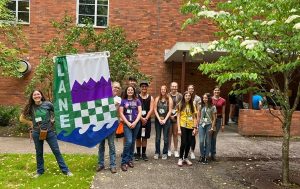‘We The People’ discuss national referenda
7 min read
Nancy Forrest (KEPW News): Alan Cohen from We The People, a new political party on the Oregon ballot, is with us again to discuss policy ideas. He has previously presented recall of Supreme Court decisions and a federal job guarantee. Alan, what do you have for us today?
Alan Cohen (We The People Lane County): Today I will be discussing national referenda, but before I begin, I’d like to clarify what I mean when I say that these issues are rarely considered or mentioned.
[00:00:27] As I indicated last time, there is actually a law passed by Congress and signed by the President in 1978 that sets full employment as a goal, rather close to a federal job guarantee, but it is universally ignored and virtually unknown.
[00:00:46] National referenda were required by federal law to approve both national and state constitutions early in our history and there has been a National Citizens Initiative for Democracy (NCID) promoting national referenda since the 1970s. During the second term as U.S. senator in the second session of the 95th Congress, Sen. Mike Gravel co-sponsored S.J. Resolution 67: 1977 voter initiative constitutional amendment introduced by Sen. James Abourezk, South Dakota, and Sen. Mark Hatfield, Oregon.
[00:01:31] Though it failed to make it out of committee, it suggests a recently active interest in the subject. However, until I began to research these topics, I was unaware of both the full employment law and the National Citizens Initiative for Democracy (and when I searched ‘national referendum’ and ‘proposals to create national referenda,’ I found references only to state referenda and to why we don’t have national referenda while most other countries do. None to the NCID. A third adjustment of terms did finally uncover, at least the NCID.)
[00:02:12] I have seen no reference to these issues in the mainstream media or the alternative press online. And in conversation with various people over a lifetime, I have never heard anyone mention these issues without my prompting and nearly always surprised to hear about them when I spoke of them. That’s what I mean by rarely considered.
[00:02:36] I want to make it clear that the ‘We The People’ party is not promoting these policies. It is suggesting that they be part of the national discussion of changes that might help us return towards government of, by, and for the people.
[00:02:53] Nancy Forrest (KEPW News): What about state referenda? What has been their history and how have they worked out?
[00:02:57] Alan Cohen (We The People Lane County): Except for the approval of state constitutions, state referenda (also called citizens’ initiatives) did not exist until 1897, and the first one voted on was in Oregon in 1906. Since then, Oregon has had more ballot initiatives than any other state. About half the states now have approved introduction of initiatives and referenda (half still have not), and such measures now often appear on the ballot in those states during elections.
[00:03:34] The timing of the appearance of state referenda was not arbitrary. It was the deregulation of corporations, the increase in corporate power over state governments and the loss of influence of civil society that created the demand for a measure to bypass those governments and let the people determine the laws they felt were the most appropriate.
[00:03:59] The corporate growth in power I’ve just referred to took place between 1875 and 1929. The populist and progressive movements that that growth spawned supported the development of state referenda.
[00:04:14] Nancy Forrest (KEPW News): What kinds of things have their referenda addressed?
[00:04:18] Alan Cohen (We The People Lane County): Through the resulting referenda, many relatively minor technical and procedural issues have been addressed (for example, allowing a state to use proceeds from forfeited property as designated by the legislative assembly and extending the debt; extending the deadline for a governor to veto legislation after the legislature adjourns from 20 days to 30 days, etc.)
[00:04:46] But larger issues have also been addressed. A revolt against increasing property taxes began with Proposition 13 in California and spread in referenda across the country. Decriminalizing marijuana, repealing slavery language still on the books; improving healthcare; increasing the minimum wage; decreasing money in politics; and other populist concerns have been dealt with. Issues that are, or were at the time controversial, have also been tackled: same sex marriage; gun control; abortion; capital punishment; etc.
[00:05:23] These measures have had a substantial impact on and sometimes preceded laws past or court decisions addressing these same issues. However, it is becoming increasingly common for lawmakers across the country to not only ignore the will of the people, but also actively work against it.
[00:05:42] From 2010 to 2015, about 21% of citizens initiatives were altered by lawmakers after they passed from 2016 to 2018, lawmakers altered nearly 36% of passed citizens initiatives. Lawmakers argue, as one explanation, that outside groups often have had a large impact on the passage of such referenda, but such groups just as often oppose referenda, and they also have an outsized influence on traditional legislation and the legislators making this claim.
[00:06:20] Nancy Forrest (KEPW News): But what about national referenda? How would they work? What would they look like?
[00:06:25] Alan Cohen (We The People Lane County): A similar growth in corporate power to the one that began around 1875 began around 1975, and the thus far ineffective effort to introduce national referenda began soon after. (However, Corporate America is this time more determined and better organized, and it has more powerful tools this time around, while the people are less coordinated and have a more diffuse focus.)
[00:06:54] Once again, national referenda will only have a chance of becoming policy if a government of ,by, and for the people attains office, which will require a third party not beholden to corporations in the rich. If that does occur, there is much to learn from the state initiative referendum experience (and the experience of other countries with national referenda) to inform any federal referendum policy.
[00:07:20] (Of course, there is a way in which this would be like the recall of Supreme Court decisions we discussed previously. However, instead of waiting for a decision the public does not agree with, the public could address any issue early on. Moreover, it allows anticipation of or disagreement with the legislative and executive branches as well.)
[00:07:47] Nancy Forrest (KEPW News): What specifically have we learned that might be useful in creating national referenda?
[00:07:53] Alan Cohen (We The People Lane County): First, any legislation introducing national referenda should include a ban on promotion or advertising.
Second, it should designate more than just a majority for the adoption of referenda. Brexit, for instance, was passed in England by a 52 to 48% vote. If the threshold for acceptance were, let’s say 60%, we could be fairly certain that the vote was representative of the people’s will, not just a temporary preference or an attempt to send a message or the like.
[00:08:31] That would also help to address the question of whether any particular initiative was one that should affect the entire nation rather than be addressed on a state-by-state basis.
[00:08:41] Third, the history of slavery suggests that state-by-state solutions can be problematic when issues are foundational, and in that case, a national solution should be sought. Abortion, for example, may or may not be a similar issue in our time.
[00:08:59] One role for a proper Supreme Court, a nonpartisan court acting of, by, and for the people would be to protect minorities from what has been called mob rule. At present, the only minority it protects is the super rich. But if popular executive or legislative enthusiasm were to disadvantage innocent bystander minorities, the Supreme Court could temper that enthusiasm.
[00:09:30] (But the concern about mob rule is overwrought. People only become mobs in the streets drunk temporarily with the spontaneous inebriation that physical crowds produce. The whole idea of democracy is ruled by the people and depends upon the wisdom of crowds. That is what made America special in the first place that we were replacing elite rulers with the rule of, by, and for the people, and that is why referenda are important. In our experience of everyday life, the threat is from moneyed interests, not from the people.)
[00:10:06] Fourth, issues might be divided into non-controversial and controversial on the basis of unbiased national polls. Any issue with more than 65% approval could be considered non-controversial and simply put on the ballot for a vote on Election Day.
[00:10:25] From those with the requisite number of signatures that had less than 60% approval, one (perhaps the one with the highest approval rating in that range) might be chosen as the controversial issue of that year. Then it could be addressed in national broadcasts by all available media once a week or biweekly for a few months.
With all relevant viewpoints being represented, a true national discussion could ensue that would provide everyone with an opportunity to understand all the implications and complexities of the policy and its likely impact on various parts of the population. It would also help to make the final proposal as appropriate as possible and encourage meaningful shared civic participation.
[00:11:14] Of course, others may have better ideas about how to organize national referenda. The goal here is merely to give the idea a small push toward consideration and to give an idea about how it might function. Thank you for listening.
[00:11:29] Nancy Forrest (KEPW News): That’s Alan Cohen with policies that the new Oregon political party ‘We The People’ hope to discuss. You can learn more at their website, wtplane.org. This is Nancy Forrest reporting for KEPW News on 97.3, Eugene PeaceWorks Community Radio.







